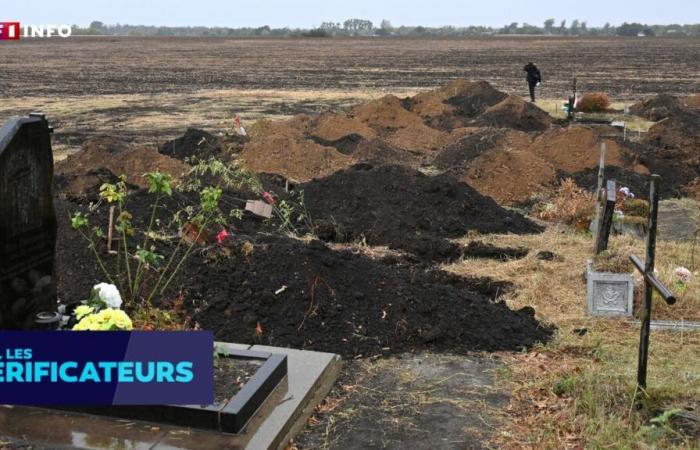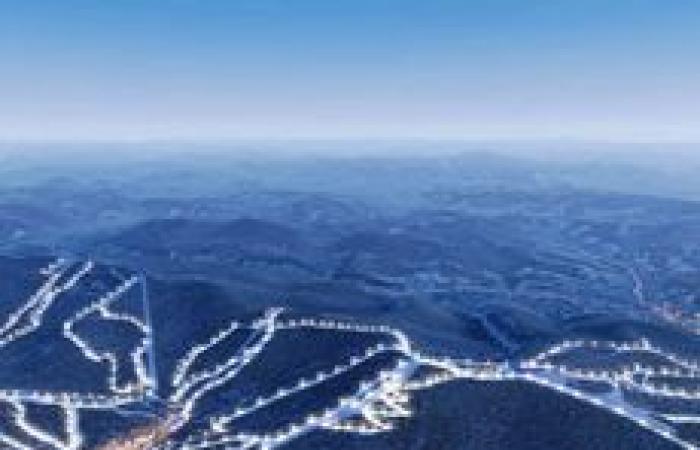In Ukraine, the war against Russia would also have very harmful consequences on the country's water resources.
A video branded Greenpeace and relayed online reports that decomposing bodies are leading to massive contamination of certain rivers.
The NGO denies these assertions: its office in kyiv explains that it was not at the origin of this sequence and suspects a Russian propaganda maneuver.
Follow the full coverage
Information scrutinized by Auditors
Ukrainian rivers contaminated? Tap water becoming dangerous? This is what a video shared on social networks in recent days claims. In English, it seems at first glance to have been produced by the NGO Greenpeace, whose logo can be found embedded.
In this sequence – loaned to Greenpeace and summarized by an Internet user (new window) – , it is written that “the expansion of cemeteries in Ukraine” because of the war “resulted in contamination of water in 16 areas with toxins from decomposing bodies”. In practice, the administration in charge of cemeteries would have, faced with the daily influx of victims, deviated from certain health safety rules. This would have led, near water collection points, to a series of contaminations by various toxins.
Greenpeace denies having made such a video
The French-speaking account which relays this sequence is not unknown, since it is regularly pinned due to its dissemination of false information. Quick research nevertheless reveals that he is not at the origin of this publication, of which we find occurrences on X a few days earlier in English. If the Ukrainian media have not mentioned the subject in recent weeks, Russian-language articles have nevertheless reported it.
A Russian media presents (new window) thus this story by explaining that an Irish journalist revealed these elements. The man, named Chay Bowes, now lives in Russia (new window). Former collaborator of the RT channel, he does not hide his proximity to the regime of Vladimir Putin, but was only one relay among others for this video. He actually shared it on November 4 (new window) to its subscribers, several days after its appearance online.
-
Read also
Ukraine: European aid diverted to build a luxurious “1.5 billion dollar” ski resort?
On the side of Greenpeace, whose colors and logo can be found in the sequence, we certify that they have never produced these images. The NGO's Ukrainian office, contacted by TF1info, believes that this “looks very much like a fake, most likely staged by Russian propaganda.” He also takes the opportunity to challenge the elements put forward by the authors, rejecting the thesis of alleged massive contamination.
“According to our knowledge and the information available, this subject has never been discussed, especially since each burial of a war victim is an eminently sensitive subject within society”notes Greenpeace Ukraine. Before adding that “all necessary respect is always given to the deceased”.
The thesis according to which the massive expansion of cemeteries and the multiplication of corpses would cause environmental damage is not defended by the authorities either. TF1info found no communication from them online on this subject. No NGO or association specializing in the defense of the environment has elsewhere provided elements that would support this thesis. When contacted, the Ukrainian national agency in charge of water resources has not yet responded to our requests.
War and environment do not mix
If Ukraine's rivers and groundwater are not victims of pollution linked to the remains of soldiers and civilians killed in the conflict, it is known that the war causes significant damage to natural environments and ecosystems. Questioned by the Ukrainian press agency Unian, the representative of the local NGO “Ecology – Law – Humanity” mentioned (new window) the multiple consequences of fighting on the environment.
“The massive use of artillery and aviation causes massive fires in natural ecosystems, particularly in forests, total damage to vegetation, destruction of animal life”and underlined Olena Kravchenko. “Small hibernating animals and insects are burned along with vegetation. In addition to fires, larger animals are threatened by military poaching, noise from military vehicles and fighting.” Director of the NGO “Ukrainian Nature Conservation Group”, Oleksiy Vasylyuk believes (new window) as for him that “The soil of war will be polluted longer than we live. It is a matter of several generations.” He notes a “obvious loss of fertility” and warns of future risks of erosion.
Do you want to ask us questions or submit information that you do not believe is reliable? Do not hesitate to write to us at [email protected]. Also find us on Twitter: our team is present there behind the account @verif_TF1LCI.







